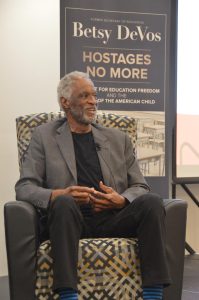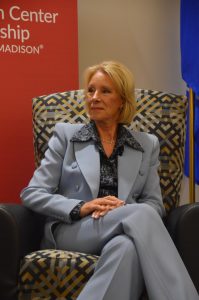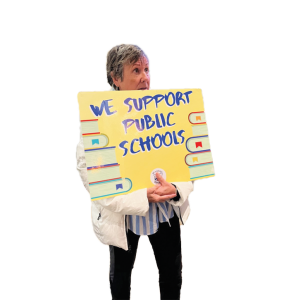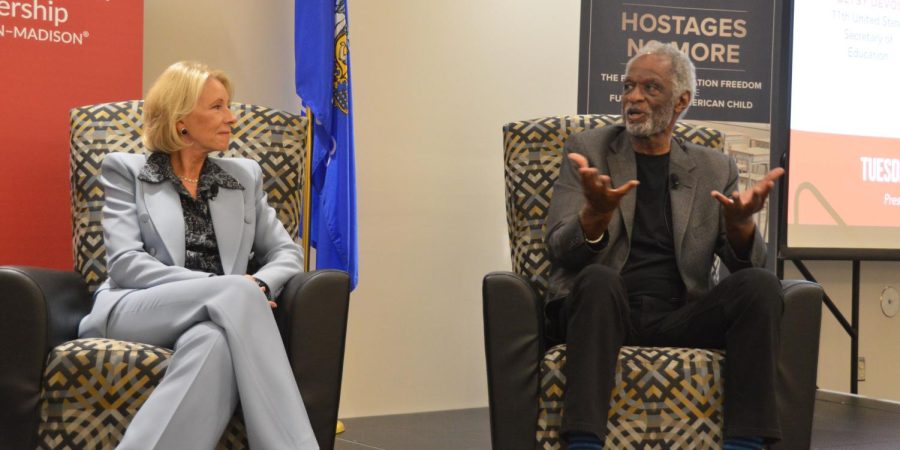DeVos, Fuller debate future of education
Liam Beran/Advance-Titan — Former Secretary of the Department of Education Betsy DeVos and Marquette University Emeritus Professor Howard Fuller discuss the future of education at UW Oshkosh Tuesday night.
October 11, 2022
“There’s a distinction between public education and the system that delivers it.” That statement by Howard Fuller, Marquette University professor emeritus, embodied the conversation between himself and Former U.S. Secretary of Education Betsy DeVos Tuesday night.
The event, titled “In Conversation with Betsy Devos and Howard Fuller: The Future of Education” was presented by UW-Madison’s Tommy G. Thompson Center on Public Leadership at UW Oshkosh.
DeVos served as Secretary of Education for the Trump administration from 2017-2021; she resigned shortly after the Jan. 6 insurrection and before President Biden took office. Fuller is a long-time civil rights advocate and the former superintendent of the Milwaukee Public School district. He is well known for his 2014 novel “No Struggle, No Progress: A Warrior’s Life from Black Power to Education Reform,” which details his pursuit of education reform, especially among Black students.
While introducing the event, UWO Chancellor Andrew Leavitt said, “We appreciate opportunities to meet and engage with national leaders and scholars who share the [Thompson] Center’s commitment to reach out to campuses and communities … and examine topics, trends and ideas that often expand and even challenge our notion about learning and life here and beyond.”
The event, which was moderated by Gerard Randall, an associate of the Thompson Center, devoted the first hour to questions posed by Randall to both DeVos and Fuller.
Fuller and DeVos share a belief in the value of parental choice and school choice in education. DeVos characterized policies furthering these values as “education freedom.”
“The money for the child follows the child to where the family decides is the best fit and the best environment for him or her,” DeVos said. “With education freedom will come a lot more creativity with the kinds of schools and the kinds of learning environments that kids can access.”
Fuller affirmed his support for school choice, but qualified that support, saying that the material needs of families have to be met in addition to “the right of people to choose a school.”
DeVos and Fuller addressed a variety of other topics, including school safety, political polarization, school boards and President Biden’s student debt relief program.
On debt relief, DeVos made her position evident.
“I’ve said it before and I’ll say it again: it’s a horrible policy and it’s illegal,” she said. “An executive cannot just take the role of Congress and shift the cost of billions and billions of dollars onto two out of three of American taxpayers who did not attend college or who have faithfully paid off college loans.”

Fuller understands that concern, but said the issue is more complex.
“I actually get the concern that people who have never gone to college have,” he said. “[They think] ‘why should I have to pay … taxes for people who went to college [when] I never had the chance to go. I would then say, let’s talk about a whole bunch of other things that you pay for with your taxes that do not benefit you.”
Fuller added, “I don’t know that I necessarily disagree with every aspect of [what DeVos said]. For people who are having enormous debt by virtue of going to college, I would try to figure out ways for people to give service to our community as a way to help eliminate some of that debt.”
Both DeVos and Fuller’s ideas surrounding education have provoked controversy. As reported by The Hechinger Report, a publication covering “inequality and innovation in education,” Fuller’s dedication to Black-led, Black-majority schools “has created unlikely alliances with deep-pocketed conservatives and has put him at odds with mainstream civil rights advocates.”
Meanwhile, in an NPR article, “How Education Secretary Betsy DeVos Will Be Remembered,” reporter Cory Turner says that DeVos was alternately a “hero” to “Christian conservatives” and a “stone-cold villain” to her critics. In her time as Secretary of Education, DeVos rolled back Title IX sex discrimination protections in education and removed Obama-era instruction intended to discourage racial disparities in school disciplinary measures.
UW-Green Bay Associate Professor and the Vice President of the American Federation of Teachers-Wisconsin’s Higher Education Council, Jon Shelton, says that the choice to feature DeVos in particular is troubling without providing further context about her position as Secretary of Education.
“DeVos should absolutely be allowed to speak on campus,” Shelton said prior to her appearance. “We are troubled that this conversation is occurring without any additional viewpoints that might be able to contextualize DeVos’s tenure in the Department of Education.”
Shelton criticized DeVos as being an inappropriate choice as Secretary of Education due to her “heading a federal department that she did not believe in.”
DeVos reiterated that she would dismantle the Department of Education if she regained her position.
“The education department was created in order to advance federal support for education, on equal terms, for every citizen in the United States,” Shelton said. “Instead, after confirmation she did the opposite of what she was tasked to do.”
Although he and AFT-Wisconsin do not oppose school choice, Shelton also desired to provide additional context to the school choice programs favored by Fuller and DeVos.

“The problem is that DeVos wants to subsidize private school education with taxpayer money, undercutting the premise of a common school education for all students by siphoning money away from public schools,” Shelton said. “So ‘school choice’ as she means it is a wolf in sheep’s clothing designed to critically weaken the sustainability of an institution critical to our democracy and public schools.”
UWO Political Science Professor David Siemers also criticized DeVos prior to her appearance.
“DeVos has led the charge to privatize schooling, she defends for-profit education and the defunding of public schools through voucher programs,” Siemers said. “Wisconsin has had a long tradition of support for public schools and understanding that the state University System benefits the whole state. Secretary DeVos’ vision seems to run counter to that tradition.”

Jean Erdman, retired professor for UWO’s College of Education and Human Services, also had criticism for DeVos and stood outside the Culver Center doors before and after the event holding a sign saying “We support public schools.”
“I think that people need to know that she is an advocate of charters with no strings which has the potential to kill public education,” Erdman said. “Public education brings us together and helps us learn to live with one another and get along. She could fund charter schools out of her billion dollar checkbook if she wanted to. To take the money for charter schools out of public education is just wrong.”
According to a 2019 fact-checking article from The Washington Post, DeVos’ proposed Education Freedom Scholarships would force taxpayers to “be footing up to $5 billion of the cost in lost revenue from the new tax credits. That means foregoing revenue that could have been used on building roads or paying teacher salaries.”
Both Fuller and DeVos ended the event by emphasizing the importance of sharing debate and different solutions.
“I’m glad to call the Madam Secretary a good friend of mine, but we don’t have to agree on every single thing,” Fuller said. “What is important is that we’re able to figure out some things that we do agree on and that we can work to try to figure out how to get that done.”














